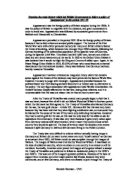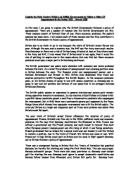The Treaty was very difficult to enforce without actually having troops in Germany and Britain did not want to start wars over such “small matters” as German re-armament from 1933. All Britain could do was complain through the League of Nations. The League of Nations was invented by Woodrow Wilson. It was based on the idea of collective security, where an attack on one country is an attack on all the members. Ironically, America never joined the League as Congress refused to accept the Treaty of Versailles and preferred to follow an isolationist policy in the 1920’s and 1930’s. This was one of the League’s greatest problems. Because of the lack of support from America, and other major powers like Russia, because they were communist, and at first Germany, who were not allowed to join through the Treaty of Versailles, the League only had the power of France and Britain behind it. This meant there were not enough major powers to enforce punishments on other countries, and because there was no collective League army, all it could do was complain, and eventually impose sanctions on trade. Even if they did that, the other country would just leave, as countries were freely allowed to come and go as they pleased as they were not tied to the League of Nations because they hadn’t supplied troops or money. This was a real problem when the Japanese invaded Manchuria in 1931.
The depression in 1930 led to instability in the world’s markets. Trade collapsed as countries put up trade barriers. Countries turned to a more nationalist approach, in particular Japan, Italy and Germany. They looked towards other counties to get their resources, both Italy and Germany needed oil, and Japan needed many raw materials. Because Japan needed these raw materials, and trade between them and America was banned, the Japanese Army-based dictatorship looked towards Manchuria for these resources and the Chinese were too weak to resist the following attack. Japan annexed Manchuria, and when China protested to the League of Nations, a commission was sent to find out what was going on there. However, because the commission had to travel by boat, it took almost a year for them to return their report. Japan simply left the League, and in 1937, they invaded the rest of China. The attack by Japan proved to the rest of the world, particularly Hitler and Mussolini that the League was not powerful enough to deal with major countries. The dictators saw that the League preferred to follow a policy of appeasement, rather than using force to apply sanctions.
Again in 1935, the League of Nations again tried to appease an aggressor, this time it was Mussolini. At first, Italy had good relations with France and Britain, but Mussolini’s quest for an empire led to conflict. When Italy invaded Abyssinia it’s leader, Haile Selassie appealed to the League of Nations, the League Condemned Italy’s actions but no further action was taken. On the other hand Britain and France tried to negotiate with Mussolini in secret. The Hoare-Laval Pact offered Mussolini two-thirds of Abyssinia. Britain did impose sanctions, but oil was not included and the Suez Canal was not closed. However the Hoare-Laval Pact was discarded by Mussolini and made public. Consequentially the League of Nations lost all credibility and Britain and France had annoyed Mussolini. From 1935, Italy increasingly looked to Germany as an ally.
Another reason for appeasement was that Britain was not ready for war. Even had the British people been prepared to take action to stop the aggressive acts of the 1930s, which it didn’t, it is highly unlikely that the British forces would have had the ability to do so. For much of the decade Britain was unprepared for a large-scale war and therefore the government was reluctant to take any action, such as an ambitious rearmament plan, which could lead to one. The British Government had also spent less on arms in the 1930s due to the Depression. One reason for avoiding or delaying war was what some call Imperial overstretch. Maintenance of Britain’s Empire had been rested squarely on the shoulders of the Royal Navy, and the majority of what public money had been available to the armed forces, had been channelled into maintaining a global naval presence. The consequent neglect of the Army made it impossible for the government to even consider sending a large land force to the continent as had been the case in the previous war. Nor could Britain have found hope in military support from her allies; France was a weak and divided country, while America remained very much isolationist. Britain, therefore, wanted to avoid committing herself to any single area and instead chose to grant concessions to avoid war unless British territory was directly threatened.
Even though it was a violation of the Treaty of Versailles, after 1933 German rearmament went unchecked; however this was because most countries in Western Europe were more concerned with what was going on in communist Russia and Mussolini’s Italy. Britain thought that they could make strong, stable and seemingly prosperous Germany a barrier against Stalin and the ‘red menace’. An even better scenario to many British politicians was a future war between Russia and Germany which resulted in the destruction of communism. This hatred of communism made the British willing to look the other way when confronted with increasing evidence of Nazi oppression and crimes inside Germany. It permitted Hitler to rearm from 1933, re-militarise the Rhineland in 1936 and achieve the Anschluss in 1938. Britain considered these acts justifiable.
Faced with Hitler's demands, that Germany should acquire the outer border of Czechoslovakia in which 3,500,000 of the inhabitants spoke German, Chamberlain went several times to meet Hitler, the last on September 30, 1938, when he and the French prime minister flew to Munich. From there Chamberlain returned waving his notorious piece of paper, declaring that he had secured “peace in our time”. This treaty is known as the Munich Pact. It secured the acceptance by Great Britain and France of the demand by Hitler that the Sudetenland, was to be given to Germany, which it bordered.
However within six months of the signing the Munich Pact, the German army was in Prague and Czechoslovakia had ceased to exist as German troops marched into claim Czechoslovakia and subsequently made most of the country a German city state, therefore reversing the Munich Pact and arousing British suspicions of Hitler's dishonesty. For many Western nations the Munich Pact became the symbol of appeasement.
In many ways Chamberlain was the most honourable of the appeasers, naive but not lacking courage. His views would not have prevailed if they had not had the support of the vast majority of the politically powerful and had not caught the public mood.







